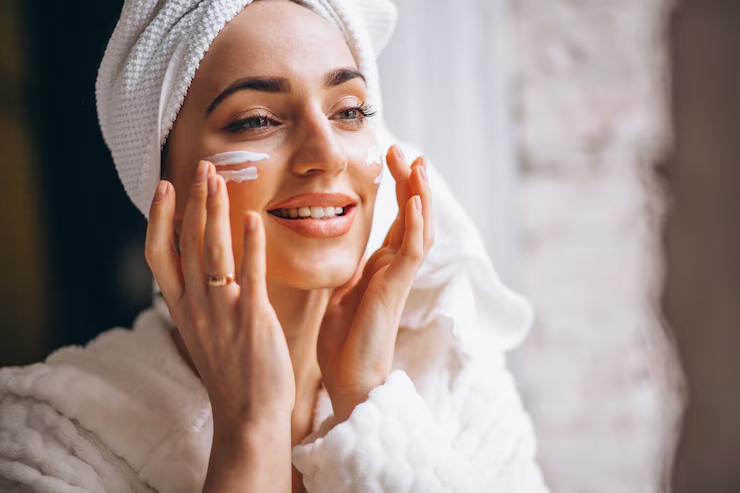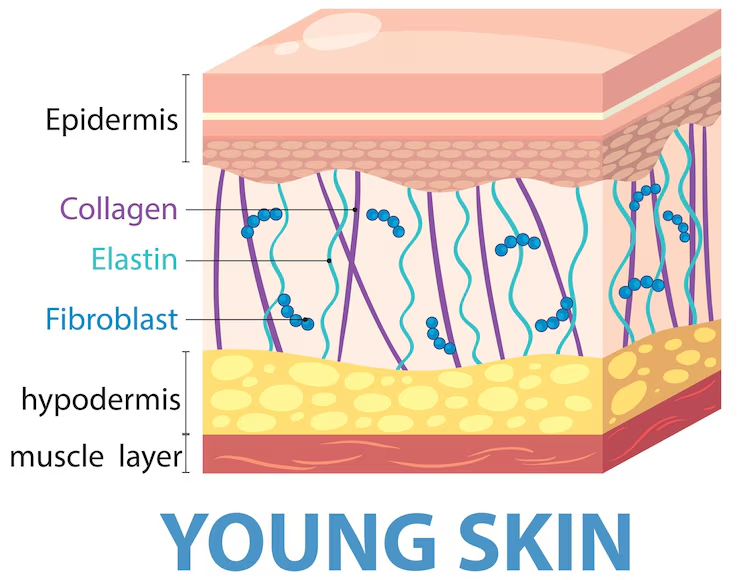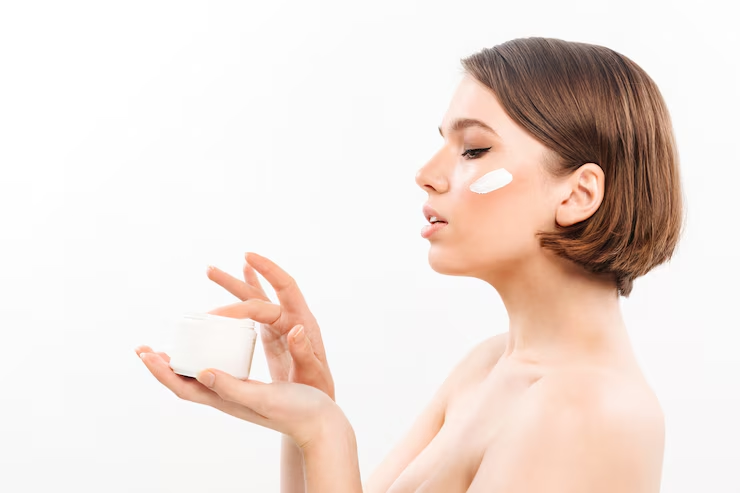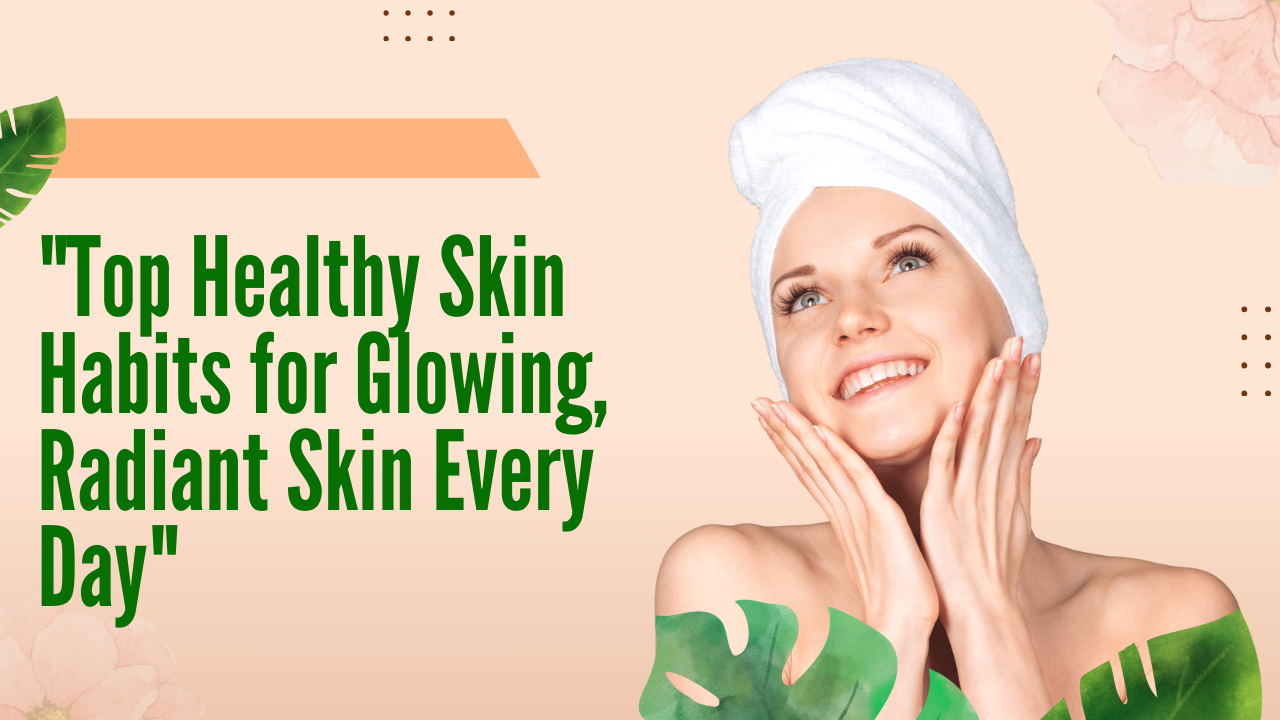Your skin is the largest organ in the body, serving as a crucial barrier against external threats. It protects you from harmful UV rays, pollution, and regulates your body temperature. Because it plays such an essential role in your overall health, keeping your skin healthy should be a top priority.
To maintain healthy, glowing skin, it’s important to develop good skin habits. This includes staying hydrated, as water helps to keep the skin plump and hydrated from within. Regularly cleansing your skin is also key to removing dirt, oil, and other impurities that can cause breakouts or dryness.
Additionally, a balanced diet rich in vitamins and minerals can support skin health. Foods like fruits, vegetables, and healthy fats nourish your skin. Don’t forget sun protection, as UV rays can cause long-term damage. With these practices, you can help maintain radiant and healthy skin for years to come.

The Importance of Healthy Skin
Skin is not just an outer layer; it’s a living organ that mirrors your internal health. Healthy skin boosts your appearance and plays a vital role in overall well-being. The condition of your skin, whether it’s blemishes, wrinkles, or other signs of aging, can reflect how well your body is functioning. When your skin is in good condition, it often signals that your body is too. Taking proper care of your skin should be a priority to maintain both a glowing complexion and your overall health.
How Skin Affects Overall Health: Your skin performs many essential functions. It acts as a barrier against harmful elements like bacteria, chemicals, and UV rays, while also helping to regulate body temperature. Additionally, it plays a key role in detoxifying the body by allowing sweat to escape. When exposed to sunlight, your skin produces vitamin D, which is crucial for bone health. By adopting skin-friendly habits, you not only improve your complexion but also support your overall health.
Overview of What Constitutes Healthy Skin: Healthy skin is smooth, hydrated, and has a balanced tone with good elasticity. It can recover from minor injuries and is free from issues like excessive dryness, oiliness, or irritation. Resilient enough to protect against environmental stress, healthy skin also shows fewer signs of aging, such as fine lines and wrinkles. An even complexion and the ability to defend against external factors like pollution and UV rays further contribute to its health. Taking care of your skin helps maintain its natural resilience and youthful appearance.
Understanding Your Skin
Before we dive into habits, it’s essential to understand the structure of your skin, its functions, and how different skin types react to external factors. Knowledge of your skin helps in choosing the right habits and products for your individual needs.
- The Skin’s Structure and Function
The skin is made up of three primary layers:

Epidermis: The epidermis is the outermost layer of the skin, acting as a protective barrier against environmental damage such as UV rays, bacteria, and pollutants. This layer also helps in preventing moisture loss, keeping the skin hydrated. It consists of several sub-layers, including the stratum corneum, which is made up of dead skin cells that shed regularly to allow for skin renewal.
Dermis: Located beneath the epidermis, the dermis is the middle layer that contains blood vessels, nerve endings, hair follicles, and connective tissue. It plays a vital role in providing strength, elasticity, and flexibility to the skin, thanks to the collagen and elastin fibers present. The dermis is also responsible for supplying nutrients to the epidermis and plays a crucial role in temperature regulation through sweat glands.
Hypodermis: The hypodermis is the deepest layer of the skin, made up of fat and connective tissue. It acts as insulation, helping to maintain body temperature by trapping heat. This layer also serves as a cushion to protect internal organs and bones, while storing energy in the form of fat. The hypodermis connects the skin to underlying muscles and bones, providing structural support.
Each of these layers plays a significant role in maintaining healthy skin, and understanding their functions will help you recognize how different habits can impact your skin’s health.
- Common Skin Types
Different skin types require different approaches. Here’s a breakdown:
Oily Skin: Oily skin produces excess sebum, which can lead to a shiny appearance, clogged pores, and acne breakouts. This overproduction of oil often results in an unbalanced skin surface that can attract dirt and bacteria.
Dry Skin: Dry skin often feels tight, rough, or flaky and can appear dull or lifeless. It lacks sufficient moisture, making it more prone to fine lines, wrinkles, and irritation. Proper hydration and moisture are key to maintaining healthy dry skin.
Combination Skin: Combination skin is a mix of both oily and dry areas. Typically, the T-zone (forehead, nose, and chin) becomes oily, while the cheeks tend to be dry. This skin type requires a balance of care to address both needs.
Sensitive Skin: Sensitive skin is easily irritated, leading to redness, itching, or allergic reactions. It requires gentle care and the careful selection of skincare products to avoid triggering reactions or discomfort.
Common Skin Issues
Common skin issues like acne, rosacea, eczema, and psoriasis are often influenced by factors such as genetics, hormones, diet, and lifestyle. In many instances, maintaining healthy skin habits can help prevent or minimize these conditions, promoting clearer and more balanced skin.
Essential Healthy Skin Habits
Healthy skin starts with daily habits. By incorporating key practices into your routine, such as hydration, proper cleansing, and sun protection, you can support and maintain a glowing complexion. Let’s explore the essential steps to keep your skin healthy and looking its best every day.
- A. Hydration: Drink More Water
Water is the simplest and most effective way to keep your skin hydrated. Proper hydration is essential for maintaining skin elasticity, supporting cell renewal, and keeping the skin plump and youthful-looking.
The Role of Hydration in Skin Health
Your skin is made up of about 64% water, and staying hydrated helps maintain its moisture balance. Proper hydration makes skin look smoother, more radiant, and reduces fine lines. On the contrary, dehydration can lead to dry, dull skin and worsen conditions like eczema or psoriasis, making hydration essential for healthy, glowing skin.
How Much Water is Needed?
Most experts recommend adults drink at least 8 cups (2 liters) of water daily. However, if you’re physically active, live in a hot climate, or are pregnant, your hydration needs may be higher. Adjusting your water intake to these factors ensures your body, including your skin, stays properly hydrated and functions optimally.
Foods That Help Hydrate Your Skin
Hydration doesn’t come solely from water. Eating foods with high water content can help keep your skin hydrated. Some excellent options include:
Cucumbers (96% water content)
Watermelon (92% water content)
Oranges and grapefruit (both rich in water and vitamin C)
- B. Proper Cleansing: Gentle Cleansing Practices

Cleansing your skin is a vital step in maintaining its health and appearance. It helps to remove dirt, excess oil, makeup, and other impurities that accumulate throughout the day. Regular cleansing can prevent clogged pores, reduce the risk of breakouts, and minimize premature aging. By keeping your skin clean, you also create a fresh base for moisturizing and applying other skincare treatments effectively.
The Importance of Cleansing for Skin Health
Throughout the day, your skin collects impurities like sweat, oil, dirt, and environmental pollutants. Cleansing helps to eliminate these elements, which can otherwise lead to skin congestion, irritation, and breakouts. It also prepares your skin to absorb moisturizers or serums, ensuring these products work more effectively.
Choosing the Right Cleanser
Selecting the right cleanser is key to maintaining skin balance. If you have oily skin, gel-based or foaming cleansers can effectively remove excess oil without over-drying. For dry skin, cream-based cleansers or oils can gently cleanse while maintaining moisture. If you have sensitive skin, look for fragrance-free, hypoallergenic cleansers that are less likely to irritate.
When to Cleanse: Morning vs. Night
Cleansing should be part of both your morning and evening skincare routines. In the morning, a gentle cleanse removes the sweat and oil your skin produces overnight. In the evening, cleansing is essential to remove makeup, dirt, and pollutants that have built up during the day. However, if you have dry or sensitive skin, you may find that cleansing once at night is sufficient to keep your skin clean and nourished.
- C. Exfoliation: Getting Rid of Dead Skin Cells
Exfoliating is an essential part of skincare because it helps remove dead skin cells, which can make the skin look dull, rough, and congested. By regularly exfoliating, you ensure that your skin remains fresh, smooth, and radiant. Without proper exfoliation, dead skin cells can build up, blocking pores and leading to blemishes or an uneven skin tone.
Why Exfoliating is Important for Healthy Skin
Exfoliation encourages the natural process of cell turnover, revealing fresher, more youthful skin underneath. By removing the outer layer of dead skin cells, exfoliating allows your moisturizers, serums, and other skincare products to absorb more effectively into your skin. This enhances their benefits, leaving your skin looking and feeling healthier.
Physical vs. Chemical Exfoliants
Physical Exfoliants: These exfoliants contain gritty particles, such as sugar, salt, or microbeads, which physically scrub away dead skin cells. While they can offer an immediate smoothing effect, they can be abrasive and may cause irritation, especially for individuals with sensitive skin.
Chemical Exfoliants: Chemical exfoliants use active ingredients like Alpha Hydroxy Acids (AHAs) or Beta Hydroxy Acids (BHAs) to dissolve dead skin cells. These tend to be gentler on the skin and are more suitable for sensitive or acne-prone skin, as they don’t involve physical scrubbing.
How Often Should You Exfoliate ?
For most skin types, exfoliating 2-3 times a week is ideal. This frequency helps to maintain healthy, glowing skin without over-exfoliating. However, if you have sensitive or dry skin, it’s best to limit exfoliation to once a week to prevent irritation and dryness. It’s important to listen to your skin and adjust your exfoliation routine accordingly.
- D. Moisturization: Locking in Hydration

Moisturizing is an essential step in skincare because it helps retain moisture, supports the skin’s natural barrier, and prevents dryness. Regardless of your skin type, applying moisturizer daily is key to maintaining hydration, softness, and overall skin health. It ensures that your skin remains nourished, protected from external irritants, and balanced.
The Importance of Moisturizing Daily
No matter your skin type, moisturizing is a crucial part of your skincare routine. Even oily skin needs hydration, but it should opt for lighter, oil-free formulas to avoid adding excess shine. For dry skin, richer, more emollient creams provide the deep hydration it requires, while sensitive skin benefits from gentle, fragrance-free products that minimize irritation.
Best Moisturizers for Different Skin Types
Oily Skin: Choose gel-based moisturizers that are non-comedogenic (won’t clog pores) to provide hydration without contributing to oil buildup.
Dry Skin: Look for thicker creams or lotions that contain hydrating ingredients like hyaluronic acid or glycerin, which attract moisture from the environment and keep your skin soft and nourished.
Sensitive Skin: Select moisturizers that are fragrance-free and hypoallergenic to avoid any irritation or allergic reactions. These products provide the necessary moisture without causing discomfort.
Tips for Applying Moisturizer Correctly
The most effective time to apply moisturizer is while your skin is still damp, just after cleansing or exfoliating. This helps to lock in moisture and ensures your skin absorbs the product more efficiently. Gently massage the moisturizer into your skin using upward motions to stimulate circulation and enhance absorption. This simple step can make a big difference in keeping your skin hydrated and healthy.
Diet and Skin Health
Your diet significantly impacts your skin’s health. Eating nutrient-rich foods can nourish your skin from within, promoting a healthy, glowing complexion. On the other hand, poor eating habits, such as consuming excessive sugar or processed foods, can contribute to skin problems like acne, dryness, and dullness.
- A. Skin-Friendly Foods
Antioxidants: Foods high in antioxidants, such as berries, green tea, and dark chocolate, play a key role in protecting your skin from free radical damage caused by environmental stressors like pollution and UV rays. Antioxidants help neutralize these harmful molecules, which can lead to premature aging, fine lines, and wrinkles. Regularly consuming antioxidant-rich foods may reduce the visible signs of aging and promote a healthier, more youthful complexion.
Omega-3 Fatty Acids: Omega-3 fatty acids, found in foods like fatty fish (salmon, mackerel), flaxseeds, and walnuts, are essential for maintaining healthy skin. These healthy fats help to reduce inflammation, which can lead to skin conditions such as acne or rosacea. Omega-3s also support the skin’s moisture barrier, keeping it hydrated and preventing dryness. Regular intake of omega-3s can enhance skin elasticity and overall skin health, making it look soft, smooth, and nourished.
- B. Foods to Avoid for Clear Skin
Sugar: Consuming high-glycemic foods, such as sugar and refined carbohydrates, can trigger inflammation in the body, which may worsen skin conditions like acne. These foods cause blood sugar levels to spike, leading to increased production of insulin, which can stimulate the production of excess oil in the skin, leading to clogged pores and breakouts.
Dairy: Some studies suggest that dairy products, particularly milk, can contribute to acne flare-ups, especially in people who are prone to breakouts. Hormones found in dairy may trigger increased oil production in the skin, leading to clogged pores and the development of acne lesions.
Processed Foods: Processed foods, which are typically high in sodium, unhealthy fats, and preservatives, can negatively affect your skin by causing irritation, inflammation, and dehydration. These foods can disrupt the skin’s natural moisture balance, leading to dryness, dullness, and exacerbating skin conditions like eczema or psoriasis. Reducing processed food intake can help maintain clearer, healthier skin.
- C. The Role of Supplements
Certain vitamins and minerals can support skin health:
Vitamin C: Vitamin C is essential for the production of collagen, a protein that helps keep the skin firm, smooth, and elastic. Collagen supports the skin’s structure, making it more resilient and less prone to sagging. In addition, Vitamin C has antioxidant properties that help protect the skin from environmental damage caused by UV rays and pollution, which can lead to premature aging and wrinkles.
Vitamin A: Vitamin A is a key nutrient in maintaining healthy skin by promoting cell turnover. This helps to shed dead skin cells and reveal fresh, new cells underneath. Regular intake of Vitamin A can reduce the appearance of fine lines and wrinkles, improve skin texture, and encourage a more even skin tone. It also supports the skin’s natural healing process and enhances its overall radiance.
Zinc: Zinc is a vital mineral that aids in the body’s wound-healing process and helps to regulate oil production in the skin. It is particularly beneficial for acne-prone skin, as it can reduce inflammation and prevent clogged pores. Zinc’s antimicrobial properties also help prevent the growth of acne-causing bacteria, making it a valuable nutrient for maintaining clear, healthy skin.
Sun Protection: The Gold Standard for Skin Health
UV radiation is a major contributor to premature aging and skin cancer. Protecting your skin from the sun by wearing sunscreen, seeking shade, and avoiding peak sun hours is crucial for maintaining skin health. These habits help prevent wrinkles, sunburns, and reduce the risk of skin cancer over time.
The Importance of Sunscreen

Daily use of sunscreen is essential for safeguarding your skin from the harmful effects of UV radiation. UV exposure can cause premature aging, leading to wrinkles, fine lines, and sunspots, as well as increase the risk of skin cancer. Even on cloudy days, up to 80% of harmful UV rays can penetrate the clouds and reach your skin. Therefore, applying sunscreen every day, regardless of the weather, is crucial for maintaining healthy skin and reducing long-term damage.
Choosing the Right Sunscreen
When selecting sunscreen, choose one with broad-spectrum protection, which guards against both UVA and UVB rays. UVA rays contribute to skin aging, while UVB rays are the main cause of sunburn. Opt for a sunscreen with an SPF of at least 30 for adequate protection. Remember to reapply sunscreen every two hours, especially if you are outdoors, swimming, or sweating. This ensures continuous protection throughout the day and helps prevent skin damage.
Sleep and Skin: Restorative Power of Beauty Sleep
Sleep and Skin Health
Sleep is vital for overall health, as it allows the body to repair and regenerate itself. During sleep, your skin undergoes essential processes, including the production of collagen and the repair of skin cells. This helps maintain skin elasticity, reduce the appearance of fine lines, and promote a fresh, glowing complexion. Quality sleep contributes to the skin’s ability to heal from daily stressors and environmental damage.
How Sleep Deprivation Affects Skin
When you don’t get enough sleep, your skin can suffer in multiple ways. Sleep deprivation leads to dull, dry skin, as the skin lacks the time it needs to repair itself. It can also result in dark circles and puffiness around the eyes, as the body’s circulation is compromised. Furthermore, a lack of rest accelerates the breakdown of collagen and elastin, essential proteins that maintain the skin’s structure and elasticity, contributing to premature aging and a tired appearance.
Improving Sleep Quality
To promote healthy skin, aim for 7-9 hours of sleep each night. Establishing a calming bedtime routine, such as reading a book or practicing relaxation techniques, can help signal to your body that it’s time to unwind. Limiting screen time before bed reduces exposure to blue light, which can disrupt sleep patterns. Additionally, creating a dark, quiet sleep environment can encourage deeper, more restful sleep, allowing your skin to regenerate and recover effectively.
Stress Management and Its Effect on Skin
Stress increases cortisol levels, which can trigger inflammation, acne, and exacerbate conditions like eczema.
The Link Between Stress and Skin

Stress causes the body to produce excess cortisol, which increases sebum production. This excess oil can clog pores, leading to breakouts and other skin issues. Chronic stress can also worsen existing skin conditions like acne, eczema, or psoriasis. To maintain clear and calm skin, reducing stress is essential. Practices like mindfulness, yoga, or meditation can help lower cortisol levels, promote relaxation, and improve skin health by reducing inflammation and preventing stress-induced flare-ups.
Lifestyle Habits for Healthy Skin
A. Exercise and Skin Health
Regular physical activity improves blood flow, allowing more oxygen and nutrients to reach your skin cells. This enhanced circulation helps nourish skin from within, giving it a healthy glow. Exercise also promotes sweating, which can help flush out toxins and unclog pores, leading to a clearer complexion. Over time, consistent exercise can improve skin tone, reduce stress (which benefits the skin), and promote overall skin vitality.
B. Avoiding Smoking and Excessive Alcohol
Smoking damages collagen and elastin—proteins essential for skin strength and elasticity—causing premature sagging and wrinkles. It also narrows blood vessels, reducing the oxygen supply to skin cells, which can lead to a dull, uneven tone. Excessive alcohol dehydrates the body and the skin, stripping away moisture and making skin appear tired, puffy, or inflamed. Avoiding these habits can help preserve youthful, healthy-looking skin.
Professional Skin Care Treatments
Along with good daily habits, professional skincare treatments can offer deeper and more targeted solutions for problems like acne scars, dark spots (hyperpigmentation), fine lines, and uneven texture. Treatments such as chemical peels, laser therapy, microdermabrasion, and microneedling are often used to improve skin appearance and health. These treatments work beneath the surface, encouraging collagen production and skin renewal. Consulting a licensed dermatologist or aesthetician ensures you receive expert advice tailored to your skin type and concerns, helping you choose the safest and most effective options to support and improve your overall skincare routine.
Conclusion
Healthy, glowing skin doesn’t happen overnight—it takes daily care and commitment. Staying consistent with habits like proper hydration, gentle cleansing, and regular moisturizing lays a strong foundation for long-term skin health.
Protecting your skin from sun damage, managing stress, and getting enough sleep are equally important. These actions support your skin’s ability to repair itself and stay strong against aging, pollution, and other external stressors.
When you take a complete, well-rounded approach to skincare, your skin not only looks better—it also works better. Since your skin reflects your overall health, giving it the right attention helps it stay youthful, smooth, and radiant. Treat your skin with care every day, and you’ll enjoy long-lasting benefits in both appearance and wellness.
FAQs
- How often should I cleanse my skin ?
It’s important to cleanse your skin twice a day—once in the morning and once at night. Morning cleansing removes sweat and oil buildup from overnight, while nighttime cleansing eliminates dirt, makeup, and pollutants from the day. However, if you have sensitive or dry skin, you may want to cleanse only once a day, preferably at night, to avoid over-drying your skin. - Can drinking water really improve my skin ?
Yes, staying hydrated is crucial for healthy skin. Water helps to maintain skin elasticity, prevent dryness, and flush out toxins. While hydration alone isn’t a magic cure for skin problems, it significantly contributes to smoother, plumper, and more radiant skin. Aim for at least 8 cups (2 liters) of water a day, but you may need more based on your activity level and environmental factors. - How can I protect my skin from the sun ?
The best way to protect your skin from the sun is by wearing sunscreen daily, even when it’s cloudy. Use a broad-spectrum sunscreen with an SPF of 30 or higher, and reapply every two hours if you’re outdoors. In addition to sunscreen, consider wearing protective clothing, sunglasses, and hats, especially if you’re spending long periods of time in direct sunlight. - Does diet affect my skin ?
Yes, what you eat can have a direct impact on the appearance and health of your skin. A diet rich in antioxidants, vitamins (especially vitamin C and A), and omega-3 fatty acids can promote clear, youthful skin. On the other hand, a diet high in sugar, processed foods, and dairy may contribute to breakouts and other skin issues. Eating a balanced, nutrient-rich diet is key for maintaining healthy skin. - How often should I exfoliate my skin ?
Exfoliating 2-3 times a week is generally sufficient for most skin types. Exfoliating too often can irritate or damage the skin’s protective barrier, especially for those with sensitive or dry skin. If you have oily or acne-prone skin, you may be able to exfoliate more frequently, but it’s essential to choose gentle exfoliants and avoid over-scrubbing.


